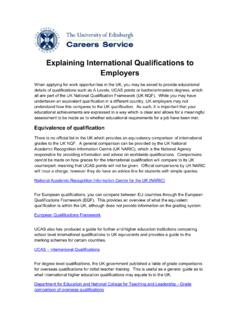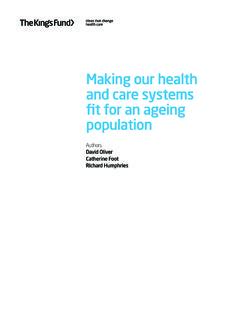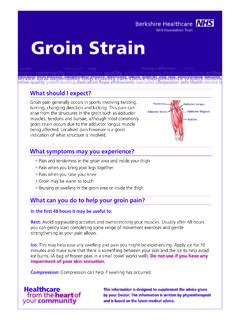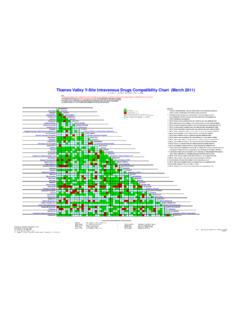Transcription of A guide to consultant job planning - University of Edinburgh
1 A guide to consultant job planningJuly 2011 Version 11A guide to consultant job planningContentsForeword 2 Executive summary 41. Introduction 52. The job plan in context 73. From objectives to the job plan 94. Supporting resources 145. The link with consultant appraisal 156. Preparing for the job plan 167. Background information the clinical manager should consider 188. The job planning process 209. The job plan detail 2210. Annualisation 2311. Locums 2712. Clinical academics 28 Annex 1: Job plan components 30 Annex 2. Annual review, mediation and appeals 41 Annex 3. The Follett review 432A guide to consultant job planningBack to contentsA guide to consultant job planningForewordAs some of the most highly skilled medical practitioners, consultants are fundamental in delivering quality and safety in medical care for patients.
2 Working as part of a coordinated team in the NHS is more important than ever the NHS is facing a series of unprecedented challenges. NHS organisations have to meet demands for high quality care at the same time as managing the transition to a radically different health system and delivering significant efficiency savings. Tackling any one of these individually would require a major effort; to do so simultaneously will need NHS consultants and managers to work together collaboratively and consultant job plan has been in place since 1991 and is at the heart of the 2003 consultant contract. The challenges currently facing the NHS underline the importance of consultant job planning as a means of organising resources effectively and efficiently in a way which brings mutual benefits to organisations, patients and doctors in the planning and delivery of high quality patient is why we have put together this new job planning guidance based on principles that we believe can be used to provide the framework for a collaborative approach.
3 Which enables consultants and managers to meet their shared responsibility for providing the best possible patient are particularly grateful to members of the NHS Employers working group and to members of the Central Consultants and Specialists Committee of the British Medical Association (BMA) for their work in developing this Mark Porter Professor Hugo Mascie-Taylor Chairman CCSC Medical Director British Medical Association NHS Confederation 3A guide to consultant job planningBack to contentsNHS Employers working group Dr Bryan Gill, Deputy Medical Director, Leeds Teaching Hospitals NHS trust (Chair)
4 Dr Jag Ahluwalia, Medical Director, Cambridge University Hospital nhs foundation trust Steve Campbell, Head of Workforce Medicine Board, University College London Hospitals Dr Mair Edmunds, Associate Medical Director, Coventry and Warwickshire Hospitals Dr Jonathan Fielden, Chief Medical Officer, Royal berkshire nhs foundation trust Dr Kathy McLean Medical Director, NHS East Midlands Alison Risker, Assistant Director of Organisational Development, Cambridge University Hospital NHS Foundation TrustBMA Central Consultants and Specialists Committee Dr Paul Flynn, Deputy Chairman (Negotiations) CCSC Dr Mark Porter, Chairman, CCSC Dr Ian Wilson, Deputy Chairman (Development and Communications) CCSC Peter Gordon, CCSC Secretariat John Maingay, CCSC Secretariat Sarah Baston, CCSC SecretariatBMA Medical Academic Staff Committee Professor Michael Rees, Co-Chair, MASCD efining a consultantConsultants should work as some of the most senior doctors in the NHS, and job planning should support and enable this.
5 Consultants accept ultimate responsibility for and delivery of expert clinical care, usually within a team. This includes diagnosis and management of complex cases and spending time and effort reflecting on and reviewing patient care activities so that quality and safety improve continuously. Consultants should also be involved in teaching, training, researching, managerial decisions, running departments and developing local services. It would not be expected that all consultants are involved in all of these activities at the same time, but rather that they are undertaken across a team of consultants at specialty/directorate level.
6 The NHS depends on consultants to be involved in the wider management and leadership of the organisations they work in, and the NHS generally. 4A guide to consultant job planningBack to contentsExecutive summaryThe NHS is undergoing a period of unprecedented structural change against a backdrop of significant financial pressure. At the same time it is striving to meet demands for higher standards of care and improved outcomes for and consultants will need to work even more closely together to ensure that NHS organisations are able to meet these diverse challenges. Effective job planning is one key mechanism through which consultants and managers can agree, monitor and deliver this shared guidance has been prepared jointly by the BMA and NHS Employers and reflects a shared understanding of the key principles which should characterise a collaborative approach to the job planning process.
7 Job planning should be: undertaken in a spirit of collaboration and cooperation completed in good time reflective of the professionalism of being a doctor focused on measurable outcomes that benefit patients consistent with the objectives of the NHS, the organisation, teams and individuals transparent, fair and honest flexible and responsive to changing service needs during each job plan year fully agreed and not imposed focused on enhancing outcomes for patients whilst maintaining service planning should not be carried out in isolation. It should form part of a dynamic, patient-focused process which incorporates organisational, team and individual objectives and in the case of consultant clinical academics is always undertaken jointly with the University guidance highlights the benefits of effective preparation for both managers and consultants and covers objective setting, information gathering and some of the supporting resources which may be required, as well as covering some of the current contractual provisions relevant to component parts of the job job plan, which is based on the principles set out in this guidance.
8 Is more likely to be an effective and mutually beneficial means of meeting the challenges that consultants and managers currently face in delivering high quality patient care in the face of testing financial circumstances and complex organisational guide to consultant job planningBack to contents1. Healthcare across the world is under the most intense scrutiny for value obtained; that is, the outcomes it delivers for the investment made in it. The NHS in England is undergoing one of the most wide-ranging reorganisations in its history aimed at enhancing quality whist reducing costs. Although the landscape of healthcare is likely to change significantly, the aim of achieving continuous improvements in quality and outcomes for patients is a necessity for doctors, managers, healthcare staff and the public.
9 The distinction between the management of care and the management of resources is becoming increasingly narrow. Now, more than ever before, consultants and managers (medical and general) have a joint responsibility to work closely together to provide the best possible care within the resources available to them. The consultant job plan, the central plank of the consultant contract, is a key mechanism through which this shared responsibility can be agreed, monitored and A job plan can be described in simple terms as a prospective, professional agreement that sets out the duties, responsibilities, accountabilities and objectives of the consultant and the support and resources provided by the employer for the coming year.
10 However, in order to drive measurable and sustainable improvements in quality, an effective job plan needs to be more than a high level timetable which sets out in general terms the range of a consultant s activity. It is vital that it articulates the relationship between the organisation and the consultant and the desired impact on patient care. The key to this is the use of SMART objectives (see Section 3). The job planning process should align the objectives of the NHS, the organisation, clinical teams (and in the case of clinical academics, their higher education institution) and individuals in order to allow, consultants, clinical academics, managers and the wider NHS team to plan and deliver innovative, safe, responsive, efficient and high-quality care.











